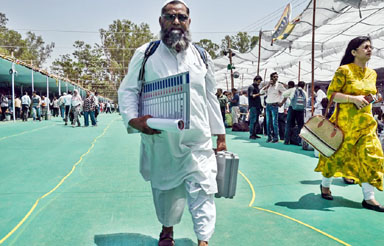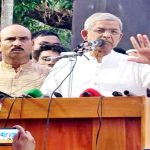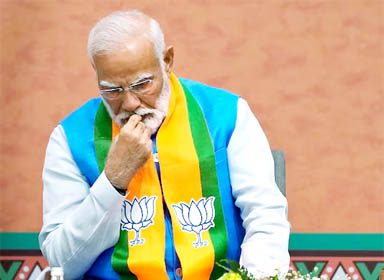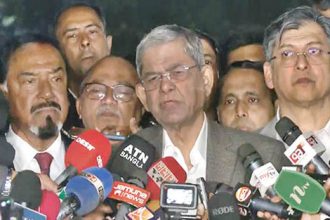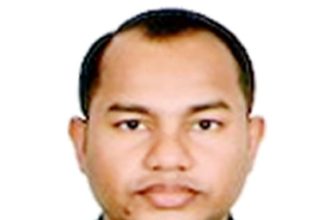DE Online Desk:
NEW DELHI, India: INDIA — the Indian National Developmental Inclusive Alliance — hope to confound expectations of an easy win for Modi’s Hindu-nationalist Bharatiya Janata Party (BJP) in a six-week election starting Friday.
During the last national vote in 2019, parties from the alliance won less than a fifth of seats in the lower house — 91 out of 543 seats, or 17 per cent, far behind the BJP’s 303 seats, or 55 per cent.
Here are the bloc’s key leaders:
- Advertisement -
Rahul Gandhi
Scion of the family that dominated Indian politics for nearly seven decades, 53-year-old Rahul Gandhi has struggled to shed the image of a privileged dynast.
The Congress Party, which has traditionally claimed to represent all faiths in constitutionally secular India, was crushed twice under his stewardship by Modi’s BJP.
Congress, the only opposition party with a pan-India presence, won just 52 lower house seats in the 2019 polls — still the second biggest party, but with less than 10 per cent of the chamber.
The BJP even defeated Gandhi in his traditional family constituency.
- Advertisement -
The four-term lawmaker has been hamstrung by several criminal cases lodged against him by BJP members, including a defamation conviction that saw him briefly disqualified from parliament last year.
After a string of public-speaking gaffes critical media lampooned him as ‘pappu’, or witless, while a leaked US diplomatic cable once dubbed the Cambridge-educated lawmaker an ‘empty suit’.
But Gandhi knows that defeating the BJP requires the coalition to stand together.
- Advertisement -
He has therefore been careful not to alienate allies by claiming he would take the post of prime minister — if they win.
M. K. Stalin
Named after the Soviet dictator Joseph Stalin, 71-year-old M.K. Stalin is chief minister of Tamil Nadu, a veteran populist held in high regard in the southern state.
Analysts say Stalin provides the opposition a much-needed ideological base to challenge Modi’s Hindu nationalism, championing social justice for those at the bottom of India’s millennia-old caste hierarchy.
Head of the Dravida Munnetra Kazhagam (DMK), Stalin has built on the towering legacy of his father M. Karunanidhi, the state’s longest-serving chief minister.
But despite nearly half a century of political experience, his appeal remains limited to his home state.
The DMK won 23 national seats in 2019, the third largest party with just over two per cent.
Several of Stalin’s DMK colleagues, including his son, are subject to ongoing criminal investigations — that they insist are politically-motivated probes to sideline him.
Mamata Banerjee
The chief minister of West Bengal, Mamata Banerjee has earned a reputation as an audacious political street fighter able to hold her own in a male-dominated world.
The wily firebrand spent her youth leading demonstrations in Kolkata against the communist state government.
Banerjee, 69, started her career in the Congress party, winning her first seat in 1984.
But she later split to start the All Indian Trinamool Congress (AITC) in 1998, and won the top state job in West Bengal in 2011.
She once forged an alliance with the BJP — serving in government as railways then coal minister.
But she is now at loggerheads with Modi, and has repeatedly thwarted the BJP’s determined attempts to oust her government in West Bengal, one of India’s most populous states with more than 91 million people.
Her AITC won 22 national seats in 2019, just behind Stalin’s DMK.
Arvind Kejriwal
The jailed chief minister of Delhi, Arvind Kejriwal once said he would ‘never fight an election’, portraying himself as an anti-graft campaigner challenging a corrupt elite.
Today, the 55-year-old former tax official is a formidable challenger — even from detention, where he has been held since last month.
He is accused of receiving kickbacks while handing out liquor licences to private companies.
His Aam Aadmi Party (AAP), or Common Man’s Party, has twice defeated the BJP to control the capital.
Kejriwal has pushed populist policies such as generous electricity subsidies for the poor, winning followers also in the northern state of Punjab.
He led protracted protests at government graft scandals — then under the control of the Congress party, today its coalition ally.
But the AAP’s key victories have been in state elections, and it has won only two seats in the national parliament.



